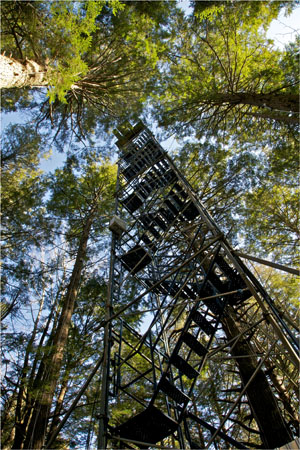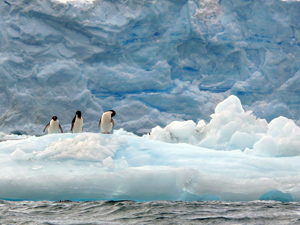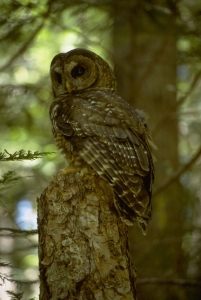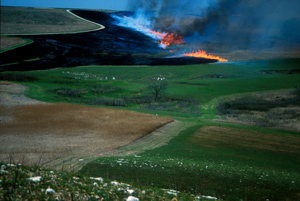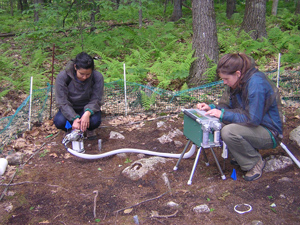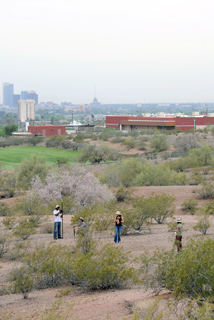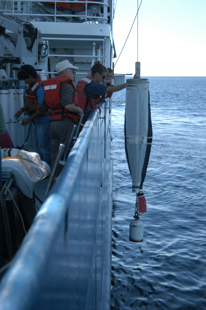You are here
Press Resources for Release on April 6, 2012 (BioScience LTER)
Questions? Contact the HF Outreach Manager, Clarisse Hart, at hart3@fas.harvard.edu; 978-756-6157.
Northeast Regional Press
Images
Click the image to download in high-res.
From this 71-foot eddy-flux tower in a 200-year-old hemlock forest, Harvard Forest scientists have measured carbon dynamics and other ecosystem processes for more than 20 years as part of the Long-Term Ecological Research program. Located in a 35-hectare Smithsonian Institution Global Earth Observatory plot and part of the core measurements for the National Ecological Observatory Network, this tower is a focal point for studies of the eastern hemlock tree and its impending demise from the invasive hemlock woolly adelgid, as well as phenology studies of succeeding hardwoods.
Photo: David Foster
Additional Resources
- Thompson, J. R., Foster, D. R., Scheller, R., Kittredge, D. B. 2011. The influence of land use and climate change on forest biomass and composition in Massachusetts, USA. Ecological Applications 21: 2425-2444.
- Northeast carbon graphs
- LTER at the Harvard Forest
National Press: BioScience, April 2012
Press Release (4/6/12): Long-term Research Reveals Causes and Consequences of Environmental Change
Interview Contact Info
Supporting Research Papers
Editorial
David R. Foster
Long-Term Ecological Research in a Human-Dominated World
G. Philip Robertson, Scott L. Collins, David R. Foster, Nicholas Brokaw, Hugh W. Ducklow, Ted L. Gragson, Corinna Gries, Stephen K. Hamilton, A. David McGuire, John C. Moore, Emily H. Stanley, Robert B. Waide, and Mark W. Williams
Science and Society: The Role of Long-Term Studies in Environmental Stewardship
Charles T. Driscoll, Kathleen F. Lambert, F. Stuart Chapin III, David J. Nowak, Thomas A. Spies, Frederick J. Swanson, David B. Kittredge Jr., and Clarisse M. Hart
Scenario Studies as a Synthetic and Integrative Research Activity for Long-Term Ecological Research
Jonathan R. Thompson, Arnim Wiek, Frederick J. Swanson, Stephen R. Carpenter, Nancy Fresco, Teresa Hollingsworth, Thomas A. Spies, and David R. Foster
Past, Present, and Future Roles of Long-Term Experiments in the LTER Network
Alan K. Knapp, Melinda D. Smith, Sarah E. Hobbie, Scott L. Collins, Timothy J. Fahey, Gretchen J. A. Hansen, Douglas A. Landis, Kimberly J. La Pierre, Jerry M. Melillo, Timothy R. Seastedt, Gaius R. Shaver, and Jackson R. Webster
Ecosystem Processes and Human Influences Regulate Streamflow Response to Climate Change at Long-Term Ecological Research Sites
Julia A. Jones, Irena F. Creed, Kendra L. Hatcher, Robert J. Warren, Mary Beth Adams, Melinda H. Benson, Emery Boose, Warren A. Brown, John L. Campbell, Alan Covich, David W. Clow, Clifford N. Dahm, Kelly Elder, Chelcy R. Ford, Nancy B. Grimm, Donald L. Henshaw, Kelli L. Larson, Evan S. Miles, Kathleen M. Miles, Stephen D. Sebestyen, Adam T. Spargo, Asa B. Stone, James M. Vose, and Mark W. Williams
The Disappearing Cryosphere: Impacts and Ecosystem Responses to Rapid Cryosphere Loss
Andrew G. Fountain, John L. Campbell, Edward A. G. Schuur, Sharon E. Stammerjohn, Mark W. Williams, and Hugh W. Ducklow
Images
Click each image to download in high-res.
Adélie penguins near the Palmer Station LTER site in Antarctica. The local population has declined by 80% since 1975 in response to climate change.
Photo: Zena Cardman
Northern Spotted Owls and their prime habitat, old-growth forest, have been the subject of intensive investigation at the Andrews Forest LTER site for 40 years. This research has been a foundation for transformation of federal forest policy from an emphasis on timber production to protection of biodiversity.
Photo: A. Levno, US Forest Service
Watershed-scale fire experiments at the Konza Prairie LTER site.
Photo: Alan K. Knapp
Summer student researchers at the Harvard Forest LTER site measure carbon dioxide in an experimental plot.
Photo: Aleta Wiley
Long-term monitoring allows scientists at the Central Arizona-Phoenix LTER to study change over time in urban desert parks.
Photo: Tim Trumble
Scientists from the California Current Ecosystem LTER site launch a zooplankton monitoring instrument.
Photo: McOwiti O. Thomas
Video
Freshwater Futures: A 2-minute preview from Freshwaters Illustrated's forthcoming short film series, Freshwater Futures, highlighting watershed and ecosystems research by NSF Long Term Ecological Research sites across the country. Supported by the National Science Foundation.
Also see the extended version currently on display in the Ecological Reflections exhibit at National Science Foundation headquarters, featuring Coweeta, Harvard Forest, Andrews, and North Temperate Lakes LTER sites.

